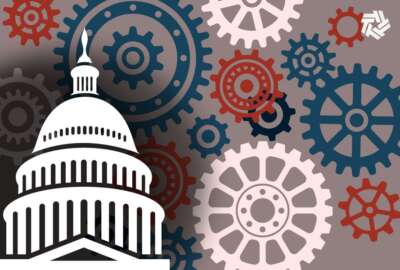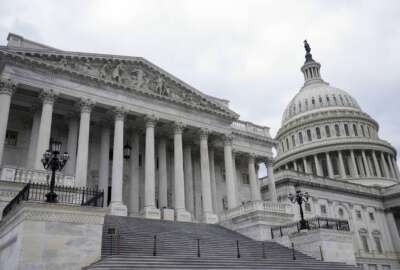
NTEU prioritizes bills to expand federal pay, benefits, but anticipates challenges ahead in Congress
An 8.7% federal pay raise, telework expansion and paid family and medical leave are among the top legislative priorities for the National Treasury Employees Uni...
A more “challenging landscape” on Capitol Hill, now with a partisan divide between the White House and Congress, has propelled the National Treasury Employees Union, for one, to become even more vocal on its latest set of legislative priorities.
At the top of the federal union’s list of concerns is securing a sizeable pay raise for federal employees next year. Although the 4.6% raise in 2023 was the largest in about 20 years, NTEU National President Tony Reardon said the boost didn’t align with the original expectation.
“You sort of match that up to increasing prices and inflation, and all of a sudden at the end, that 4.6 didn’t seem that it was going to quite go as far as I think everybody had hoped,” Reardon told reporters during a Feb. 27 press conference.
To build on the 2023 pay raise, NTEU endorsed the latest version of the FAIR Act. Though the bill has been reintroduced for at least a decade, it has never been enacted. This year’s version of the legislation would give federal employees an average of an 8.7% pay raise in 2024, split between a 4.7% base pay raise and an average 4% locality pay raise.
NTEU isn’t the only advocate of the FAIR Act. The American Federation of Government Employees and the National Federation of Federal Employees, two other federal unions, have similarly voiced support for an 8.7% raise next year.
Despite the sizeable pay increase included in the FAIR Act, many have noted that the public-private wage gap is even larger. The Federal Salary Council reported in 2022 that the salaries of federal employees lag 24.09% behind those of their private sector counterparts.
“I want to underscore this [4.6% raise] wasn’t enough,” Reardon, who sits on the council, said at NTEU’s legislative conference in Washington, D.C., on Feb. 28. “Frankly, an average 8.7% pay raise seems only fair.”
Notably, the President’s pay agent has continually called for “major legislative reforms” to the federal pay system, although it’s unclear what that would look like. But from NTEU’s perspective, the General Schedule system is still the best pay system for the federal workforce.
“I’m not suggesting that it’s perfect. But what I am suggesting is that if there are problems, let’s have a real conversation about where the problems are, and how those problems can be addressed.” Reardon said during the press conference. “We’re certainly open to hear what other ideas people have, but recognize that we are going to evaluate those on their merit and then make a decision what we think is in the best interest of our members.”
Similarly high priority for NTEU leaders are changes to benefits for federal employees, which Reardon broadly defined as a need to “hang on to what federal employees have,” and push for “an expansion where possible.”
One area of expansion that lawmakers are particularly eyeing is paid family and medical leave for federal employees. The union advocated for the reintroduction of the Comprehensive Paid Leave for Federal Employees Act, a bill that would offer feds 12 weeks of paid family and medical leave.
According to an internal survey, one-third of NTEU chapter leaders have someone in their family with a serious medical condition.
“I think it shows how paid family leave would really have a profoundly positive impact for federal employees,” Reardon said. “We all hear a lot of heartbreaking stories from members all the time, like using up all of their personal leave to take care of an elderly parent and having no leave left for themselves — or members who are forced to take unpaid leave … and then come back to work with more debt and a great deal more stress.”
Also top of mind for NTEU was the government’s telework policy. Many House Republicans have pushed to return the federal workforce to pre-pandemic telework arrangements, by passing the SHOW UP Act, but Reardon strongly criticized the rhetoric that telework caused federal staff performance to worsen.
Reardon argued instead that telework increases productivity and morale, while decreasing costs, such as those of office leases. In fact, he said, NTEU welcomes Congress to look into and collect data on the effectiveness of telework.
“I believe [it] will be very, very clear that telework works, that the productivity of federal employees will be borne out to be on the increase, that telework in no way hampers that,” he said. “I also think that it is important that agencies, Congress and anybody else who thinks about telework, remembers that one of the advantages is it is going to help in recruiting employees and retaining employees.”
Beyond these priorities, NTEU is also eyeing other big-ticket legislative items, including efforts to prevent a possible return of Schedule F for good. Although President Joe Biden rescinded the Trump-era executive order almost immediately after stepping into office, Reardon said the fight is not yet over. NTEU backed the Saving the Civil Service Act, a bicameral bill that would block future presidential administrations from reclassifying federal employees from the competitive service to the excepted service without congressional approval.
“There is a clear threat to keeping the civil service based on merit, and making sure government services are delivered by skilled professionals and not partisan loyalists,” Reardon said.
According to an internal NTEU survey, about 75% of union leaders said their biggest fear from another Schedule F type policy would be that politics would compromise their agency’s mission.
“That says a whole lot, I think, about federal employees,” Reardon said. “Federal employees are dedicated to the mission of their agencies. They’re not in this for personal gain. That’s not what it’s about for them. They’re about doing what is to the benefit of the American people.”
Given the “different landscape” on Capitol Hill, with the now partisan divide between the White House and Congress, moving forward on these legislative priorities may be rocky, and lead to a “really challenging couple of years,” Reardon said.
“We have a bit of a hostile leadership in the House. They’ve already gone after IRS funding and federal telework programs,” Reardon said to attendees of NTEU’s legislative conference. “These members are repeating the same old, tired talking points. And the fact is, they know better. They’re simply trying to score political points off the backs of federal workers.”
But ultimately, NTEU leaders said they intend to work with all members of Congress, regardless of their political alignment or track record on legislation.
“We’re not going to come to any member of the House or Senate and just automatically assume that they can’t be educated and come to our way of thinking on a particular issue,” Reardon said. “We’re going to try like heck to educate all those folks.”
Copyright © 2024 Federal News Network. All rights reserved. This website is not intended for users located within the European Economic Area.
Drew Friedman is a workforce, pay and benefits reporter for Federal News Network.
Follow @dfriedmanWFED





